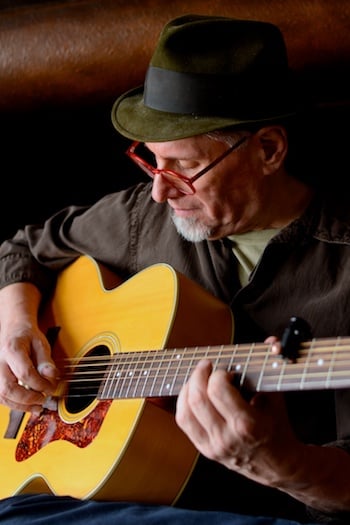Flag-bearing American acoustic instrumentalist Glenn Jones’s The Giant who ate Himself is another perfectly realised and recorded set of solo gems (reviewed here). We caught up with him to discuss the album, the heavyweight twelve-string guitar and that one audience member.
Although Glenn Jones’s recording processes are very technically simple, with single microphones best capturing the required sound from either his guitar or banjo, the location has always been very important to him, and for The Giant, he decided to revisit a spot last used six years back for My Garden State. “We decided the best of our options was to head back to Forest Hill Farm, where that one was recorded,” he tells us. “So it was a bit of a homecoming in a way because I love that spot, it’s about a quarter mile off the main road down a gravel track. It’s super quiet too, you can hear airplanes way off in the distance; in fact, on ‘River in the Sky’, the field recordings of the airplanes and the insects buzzing and all that stuff was recorded by Laura [Baird] at Forest Hill Farm, probably a couple of years ago. It’s a remote spot where you can relax and forget about the world for the week or so that you’re making the record.”

On the plus side, an instrument that does make a reappearance is Glenn’s big Guild F2512 twelve-string guitar, absent from Fleeting. It’s a guitar that Glenn enjoys but knows can be rather cumbersome… “I go through periods of playing a lot of twelve-string guitar,” he says. “I was playing lots around the time of the Barbecue Bob in Fishtown album, but then I’ll go through periods where I’ll barely pick it up. I don’t really know what the reasoning is behind that, but some pieces certainly want to be played on the twelve string and some kind of resist that. On Fleeting, ‘A Portrait of Basho as a Young Dragon’ was originally a twelve string piece, but it ended up playing better on the six string. For whatever reason, there were several pieces on this one that worked really well on twelve string, but now I’m thinking ‘what am I going to do on tour?!’ because I can’t really tour Europe with a bunch of different guitars. I’m pretty much limited to one guitar and one banjo at the most; maybe I’ll try to borrow one while I’m over…”
One of the smaller and more spacious songs on The Giant, ‘Everything Ends’, is the one I keep coming back to and one that seems to keep giving, and it’s a track Glenn also holds dearly. “I’m glad to hear you say that, because it echoes my feeling too,” he says, after a pause. “I think it may be my favourite on the record, although there are lots of good performances on there. I also love the studio cobbled together ‘River in the Sky’, but I think ‘Everything Ends’ is a pure guitar composition and it’s the one that does it for me as well. It’s part of my live set all the time now and I’m not in the least bit tired of playing it. I’m not sure what emotions it conjures up in me, but there’s definitely something special about that piece; it conveys what I want it to convey. The title is kind of a good and bad thing, everything good ends and everything bad ends and people can take it either way… I guess it is kind of a melancholy one in a way.”
We move onto talking about the American Primitive genre and how it’s alive and kicking today with players like Sarah Louise, Daniel Bachman and now Gwenifer Raymond putting their own mark on it, and briefly touch on Glenn’s helming of the wonderfully successful Thousand Incarnations of the Rose festival earlier this year, before Glenn goes on to tell a story of a less successful show. “Jack [Rose] and I were on our first tour of the States and we had one of those nights where we were between cities and we played this small town in Minnesota or Wisconsin and got there to find we were playing a pizza parlour in a mall. To get to this place you had to navigate a little rat trail and then this guy said ‘just set up over here’ on this little carpeted area used to cover up pipes or something. Jack and I looked at each other and he said ‘looks like we’ll be playing for each other tonight.’ So it wasn’t a gig to hold in exalted terms and there were probably seven or eight people there, but years later at Jack’s memorial concert, we were in Philly and a guy came up to me and said ‘oh you probably don’t remember this but I saw you guys play at this pizza parlour once’, and I said ‘man I remember that gig!’ This guy said he could never forget that show and that it opened all the doors for him and changed his life… So, you just never know. The fact that it reached that one person is great and it’s what you live for in a way; you remember those experiences when your own head was spun around after walking into something without any expectations or even knowing what it’s about.”
Pre-order here: thrilljockey.com/products/the-giant-who-ate-himself-and-other-new-works-for-6-12-string-guitar
Photo Credit: Jesse Sheppard
